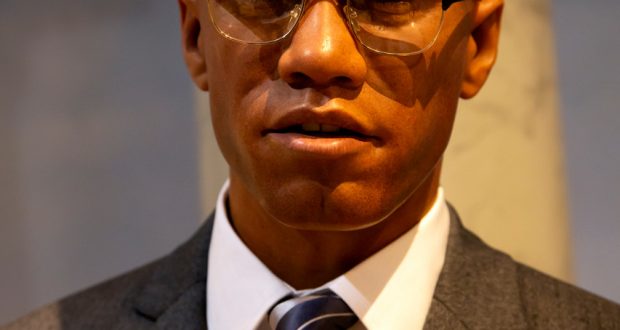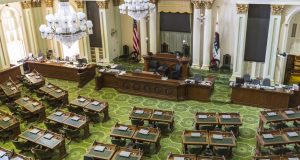By Jaivon Grant | California Black Media
Malcolm X, originally known as Malcolm Little, was born 98 years ago on May 19, 1925. He was a prominent activist and minister during the 1960s civil rights movement. His unapologetic and passionate advocacy for Black rights brought him national attention. However, some have criticized his rhetoric as being extremist and racist.
Others explain that the assertive, Black nationalistic posture he took in his speeches was necessary for Civil-Rights-era America when discrimination and segregation were legal in many parts of the country and racism was routine in many aspects of life.
To that point, Malcolm X, who was assassinated in 1965 at the Audubon Ballroom in Harlem, spoke about what some considered his extremist viewpoints.
“I don’t believe in any form of unjustified extremism. But I believe that when a man is exercising extremism, a human being is exercising extremism, in defense of liberty for human beings, it’s no vice. And when one is moderate in the pursuit of justice for human beings, I say he’s a sinner,” he said.
In 1964, Malcolm X announced his separation from the Nation of Islam, changed his name again to El-Hajj Malik El-Shabazz and converted to Sunni Islam, the branch of the religion most Muslims around the world practice. After making a religious pilgrimage to Saudi Arabia and trips to Africa, Malcolm X began to preach less about America’s racist past and divisions and more about Pan Africanism and about the universality of principles like freedom, justice and human rights, especially as they concern people of African descent.
This week, as we celebrate what would have been Malcolm X’s 98th birthday on May 19, here are ten quotes that capture Malcolm X’s promotion of racial healing, tolerance and racial inclusion.
1. On self-love …
“There can be no Black-White unity until there is first some Black unity. We cannot think of uniting with others, until after we have first united among ourselves. We cannot think of being acceptable to others until we have first proven acceptable to ourselves.”
2. On intermarriage …
“It’s just one human being marrying another human being or one human being living around and with another human being.”
3. On Truth and Justice …
“I’m for truth, no matter who tells it. I’m for justice, no matter who it is for or against. I’m a human being, first and foremost, and as such I’m for whoever and whatever benefits humanity as a whole.”
4. On Peace and Freedom …
“You can’t separate peace from freedom, because no one can be at peace unless he has his freedom.”
5. On Racial and Religious Unity …
“During the past seven days of this holy pilgrimage, while undergoing the rituals of the hajj [pilgrimage], I have eaten from the same plate, drank from the same glass, slept on the same bed or rug, while praying to the same God—not only with some of this earth’s most powerful kings, cabinet members, potentates and other forms of political and religious rulers —but also with fellow?Muslims whose skin was the whitest of white, whose eyes were the bluest of blue, and whose hair was the blondest of blond—yet it was the first time in my life that I didn’t see them as ‘White’ men. I could look into their faces and see that these didn’t regard themselves as ‘White’”
6. On Love and Unity …
We need more light about each other. Light creates understanding, understanding creates love, love creates patience and patience creates unity.
7. On Learning to Hate …
“If you’re not careful, the newspapers will have you hating the people who are being oppressed, and loving the people who are doing the oppressing.”
8. On Overcoming Hatred and Anger …
“Hatred and anger are powerless when met with kindness.”
9. On Fairness and Justice …
“You’re not supposed to be so blind with patriotism that you can’t face reality. Wrong is wrong, no matter who says it.”
10. On Human Rights …
“I believe in human beings, and that all human beings should be respected as such, regardless of their color.”
This California Black Media report was supported in whole or in part by funding provided by the State of California, administered by the California State Library.
 Westside Story Newspaper – Online The News of The Empire – Sharing the Quest for Excellence
Westside Story Newspaper – Online The News of The Empire – Sharing the Quest for Excellence





